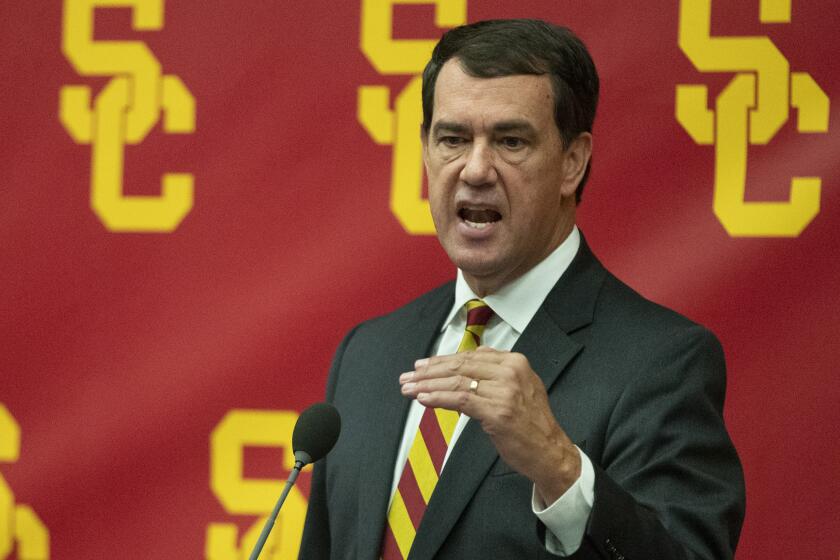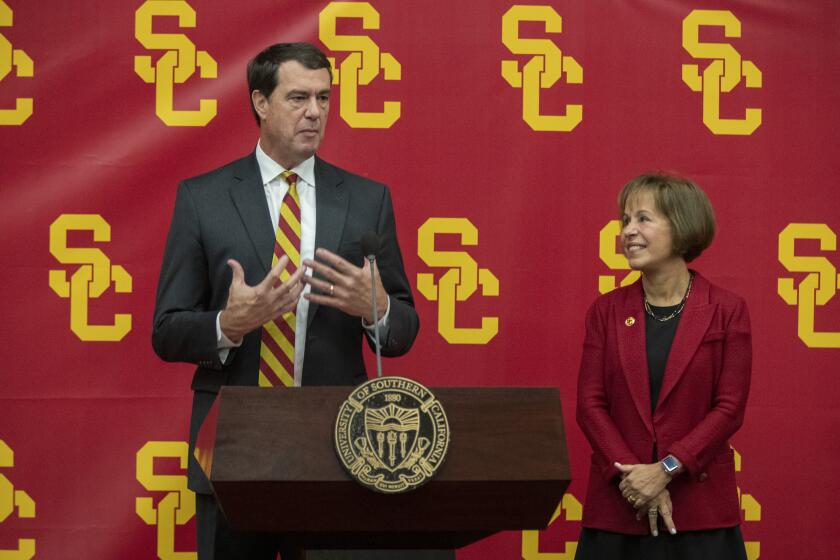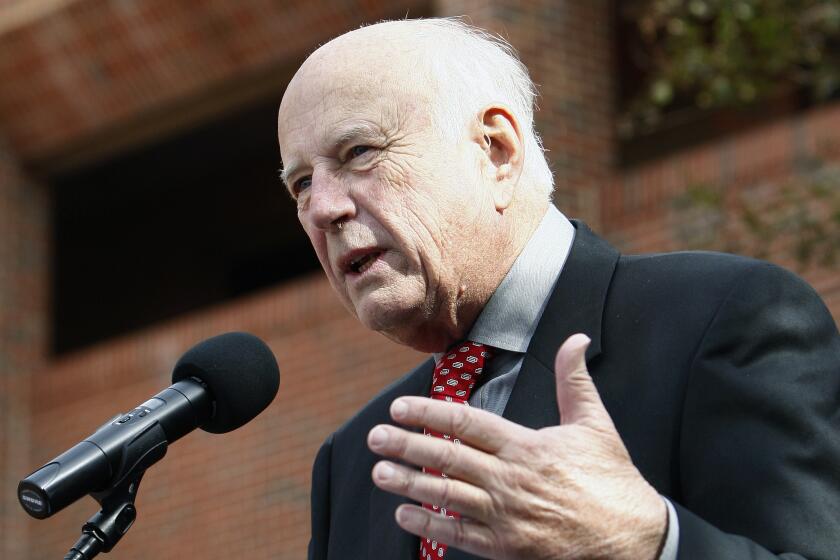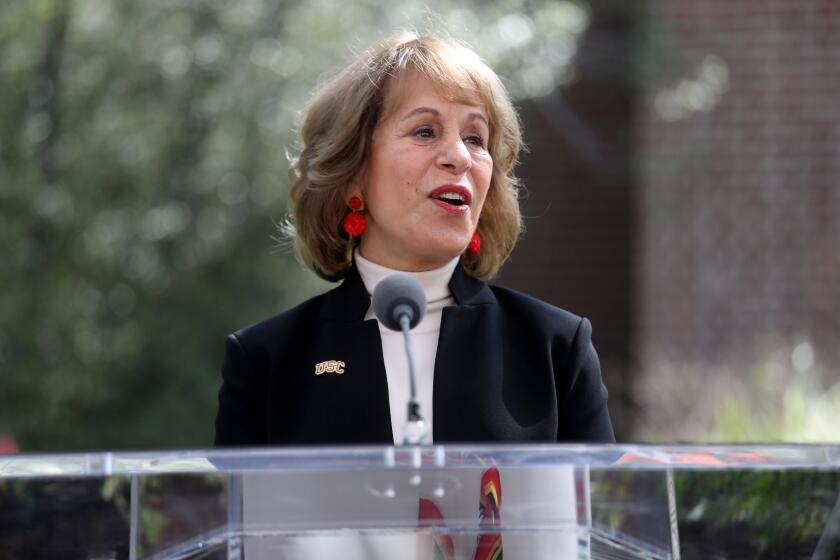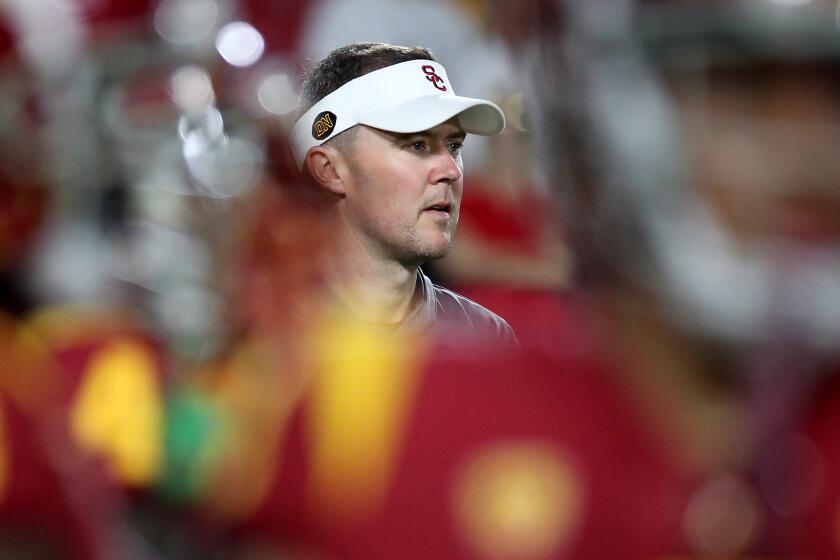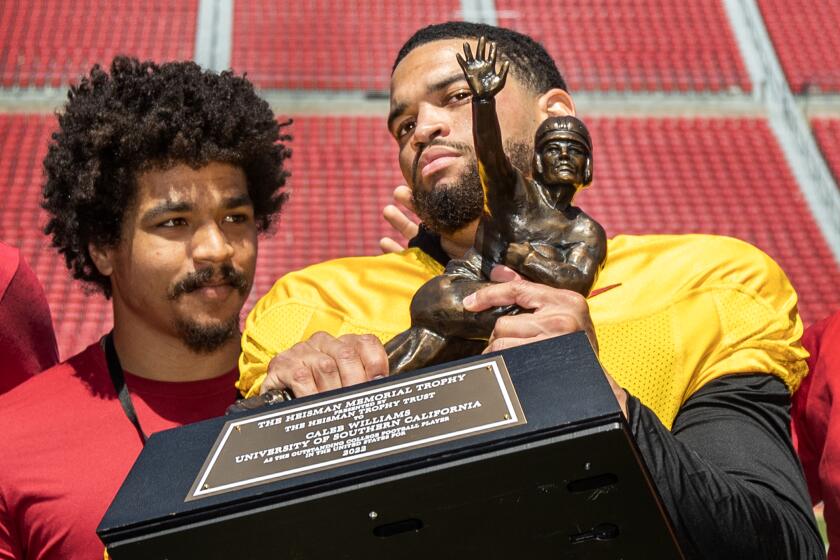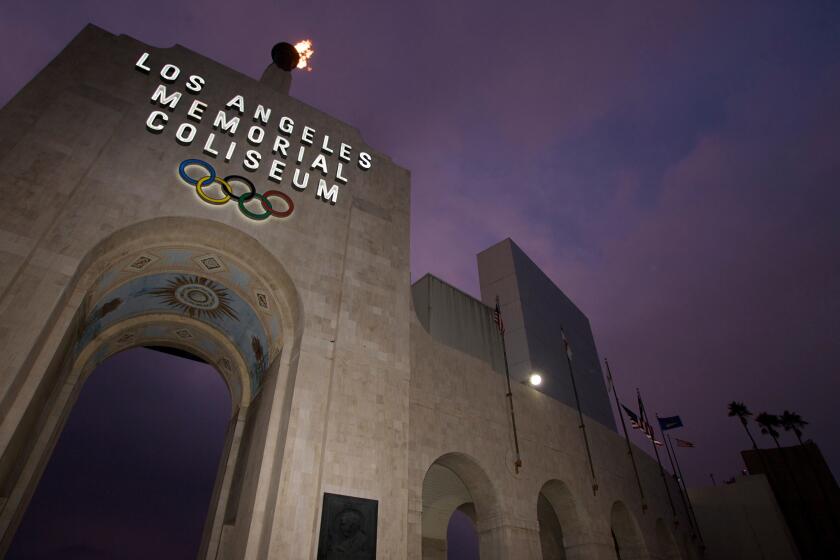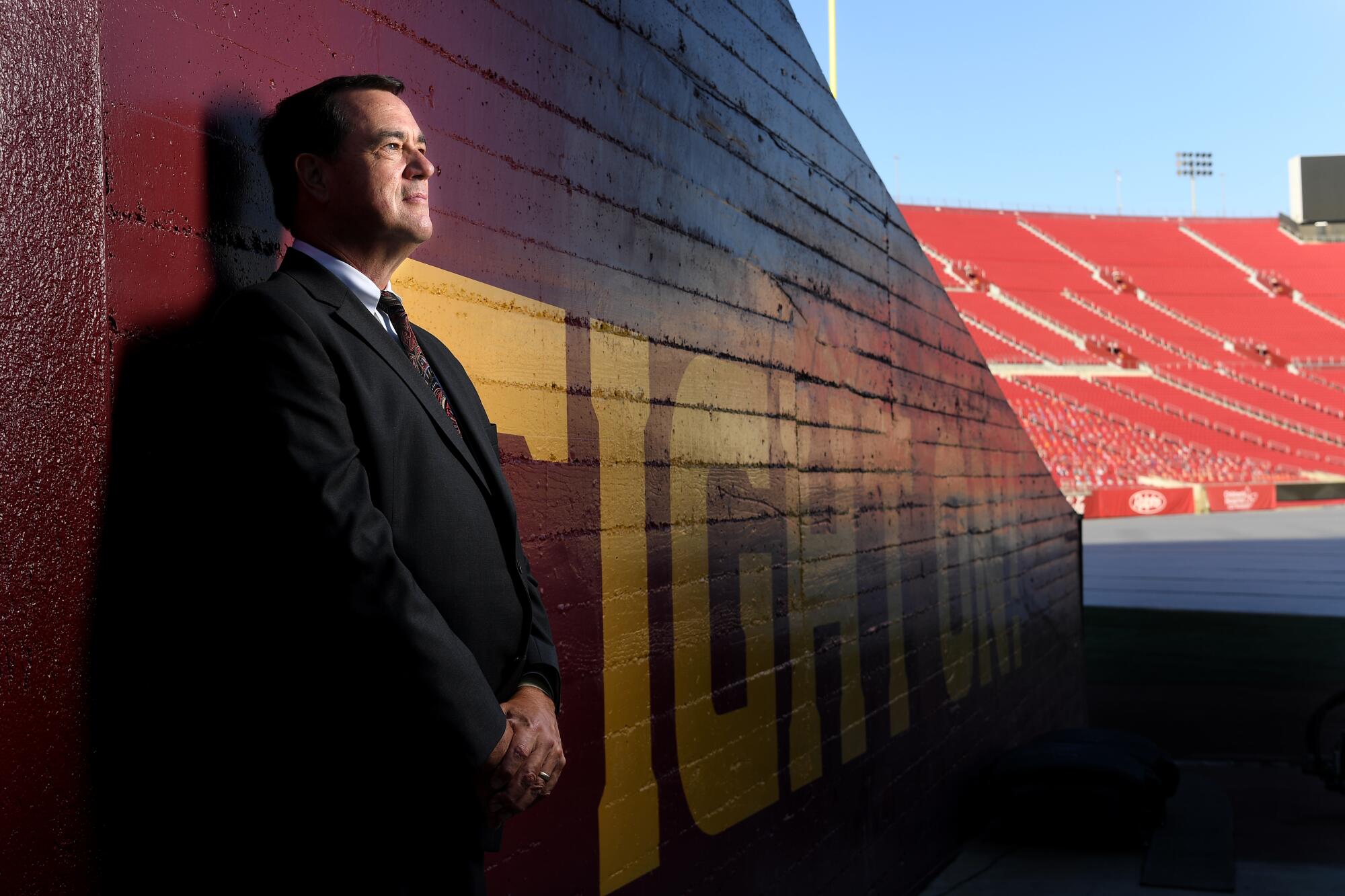
- Share via
Word first began to spread that Cincinnati’s Mike Bohn was USC’s top choice to lead its athletic department on Nov. 1, 2019.
Celebratory announcements often follow such leaks, but USC President Carol Folt did not officially announce Bohn’s appointment until Nov. 7.
It was a particularly awkward pause for Bohn, who waited in a Los Angeles hotel while USC conducted a final round of reference calls. Multiple sources granted anonymity because they were not authorized to speak publicly about the search told The Times the school was double-checking the background vetting of TurnkeyZRG, the executive search firm it hired to conduct its two-month hunt for a new athletic director.
Mike Bohn has stepped down as USC’s athletic director. Here’s our coverage from his three-plus years on the job.
Whatever new information USC learned about Bohn, the veteran college athletics administrator with previous stops at Cincinnati, Colorado, San Diego State and Idaho, did not stop the school from hiring him. During his introduction at USC, Folt described Bohn multiple times as a man of integrity.
Less than four years later, the Trojans are once again looking for an athletic director after Bohn’s abrupt resignation on May 19.
Bohn resigned shortly after The Times sent him and USC detailed questions about internal criticism of Bohn’s management of the department and unprofessional conduct dating back to his tenure as Cincinnati’s athletic director.
Turnkey spoke with more than two dozen references as part of its process, according to a source with knowledge of the search not authorized to speak publicly. But there were others working closely with Bohn at Cincinnati who could have provided a more complete picture.
In October 2019 as Turnkey performed its search, Karen Hatcher, a Cincinnati executive senior associate athletic director, filed a Title IX complaint alleging Bohn “made racially harassing and other unprofessional remarks about her and other individuals in the athletic department.” Bohn declined to respond to The Times’ questions about the allegation. On Oct. 29, days before Bohn left for Los Angeles, Cincinnati’s Title IX office interviewed Hatcher about Bohn. During the next nine days, two other current and former senior staffers corroborated her claims to investigators, according to a Times investigation.
Between late October 2019 and February 2020, as part of a separate inquiry, Cincinnati interviewed 27 people “to assess the climate and culture of the athletics department as a whole and gather the concerns of professional misconduct,” according to a document The Times obtained via public records request.
In April 2020, investigators said they found evidence of a “toxic atmosphere” within Bohn’s department. A month later, they issued similar findings in response to Hatcher’s complaint, noting that Bohn’s behavior “may have constituted evidence of a violation of university policy.”
By that point, Bohn was already well-established at USC, tasked with guiding the Trojans through a global pandemic.
There was a window of time — days and possibly weeks — during which allegations about Bohn’s behavior at Cincinnati could have been unearthed by Turnkey and USC.
A person familiar with the search not authorized to discuss it publicly told The Times that Turnkey’s vetting spanned Bohn’s past three stops as athletic director and included calls to two of his previous Cincinnati superiors, neither of whom raised any red flags.
“Mike had been at four Division I institutions. I don’t think these behaviors come about suddenly,” said Karen Weaver, an expert on college sports, media and policy at the University of Pennsylvania. “They were probably visible in other situations, but who spoke up? That’s the question. People may have experienced feelings or observations, but nobody spoke up.”
USC President Carol Folt praised athletic director Mike Bohn’s integrity. Bill Plaschke writes amid a scandal, Folt must explain why Bohn was hired.
Said Chris Hunt, the president and co-founder of Hunt Scanlon Media, a search firm trade publication, “You can check references until the cows come home and still find nothing.”
The Times spoke with more than a dozen sources who are stakeholders within the search firm industry — including a sitting university president, a longtime regent, two Power Five athletic directors, a background check specialist and numerous search firm executives — about how the industry works and the vulnerabilities inherent within it.
The stakeholders say the flaws in USC’s Turnkey-aided search that resulted in Bohn’s hire are not unique in a system with objectives often in direct conflict. Search firms are hired to maintain the privacy of candidates so that they don’t lose standing at their current schools and to perform background and reference checks that shield the client from making a costly mistake.
“There’s always tensions in systems that play against one another,” said Linda Livingstone, the president of Baylor University. “What you’re trying to do in this situation is balance doing the best job vetting candidates, knowing you are never going to be 100% sure, while protecting confidentiality because you don’t want to damage someone’s reputation at their institution. Those are certainly in tension with one another. It’s about finding the right balance.”
Inevitably, if one of those objectives is not met — the identity of a candidate leaks too early in the process or the lack of vetting exposes the school to ridicule — a third purpose for search firms comes into play: The school can blame the search firm when anything goes awry.
“They pay us for that,” one search firm executive said, speaking on the condition of anonymity to avoid hindering future business. “Part of the reason you hire an outside firm is you want someone to take responsibility for it.”
Chuck Neinas, a college athletics leader, helped shape Mike Bohn’s career. Now he’s defending the former USC athletic director facing scrutiny.
In USC’s case, in the fall of 2019, the school decided it wasn’t enough to leave all of the vetting to Turnkey. It wanted to perform its own due diligence regarding Bohn.
A USC statement to The Times said, “It is entirely commonplace for universities to conduct their own independent reference checks in connection with a high-level search.”
Turnkey started in 1996 as the college sports industry transitioned into big business. Just a year earlier, Florida State’s Bobby Bowden signed a deal to become the first head football coach to make $1 million per year.
It had become clear to universities that success in athletics led to generous donations, making every hire a must-get-right proposition. But what did school presidents and board members know about sports? Search firms were glad to offer their help in exchange for a fee that would be a drop in the bucket compared to the windfall of a football or men’s basketball championship season.
Turnkey founder Len Perna rode the wave with other industry leaders, including Parker Executive Search, College Sports Associates, DHR Global and Korn Ferry, and, over two decades amounting to around 1,500 searches, built out quite the Rolodex.
Today, at least 15 football head coaches make more than $7 million annually and their bosses, athletic directors, are routinely paid more than seven figures. With such high stakes, schools can’t afford to miss, and firms are now charging fees approaching $100,000 for some high-profile searches.
Since the USC search that landed on Bohn, Turnkey has continued its rise as an industry leader. Most recently, it led searches for the Big Ten, Big 12, ACC and Pac-12 conference commissioners, as well as the NCAA president.
Turnkey declined to respond to Times questions about the USC search process, but staff at other search firms provided a general explanation of the typical process they use to identify and vet candidates. They sought anonymity because speaking publicly could damage their industry standing.
After athletic director Mike Bohn resigned amid scrutiny, USC president Carol Folt named an interim athletic administrator and Big Ten transition team.
“It’s a relationship business, so the search doesn’t just start when you get that call and you’re working,” a search firm executive said. “Everyone is going to give you a list of references, but those are going to be the five or six people that will say glowing things. We take pride in off-list referencing. We make those calls quietly to people that we know on those campuses that we feel like have the temperature of what’s happening. I don’t like to just call folks in athletics. I call people on the academic side, board members, people that will give you an honest answer.”
A source who specializes in deep background vetting said that finding a second and third level of reference is the only way to weed out candidates with red flags because companies can’t count on the standard searches of public documents to uncover situations such as the Title IX complaint against Bohn in Cincinnati.
“Things contained in public records are not things the university president wants to know. Typically it’s personal conduct — sex, drugs and rock and roll, gambling, Title IX-related behavior,” the background vetting expert said. “None of that ever ends up in a public record. By law it can’t. So you frankly have to do some digging. You have to ask people questions. You have to ask people to lunch. That’s how you find out a character issue.”
What happens if that background research leaks and word spreads a candidate is being evaluated?
“It’s not just that it gets out that we’re talking to Mike Bohn, and he withdraws his name from the process,” one search executive said, speaking hypothetically. “The whole list withdraws. The search is over. That’s the context that’s hard for people to understand. Our job is to work with a client to make sure that they get a great hire. But if the whole list withdraws, it’s a catastrophe.”
Is it more catastrophic than poor vetting?
UCLA and USC will face plenty of challenges during their first season in the Big Ten. Here’s a rundown of who UCLA and USC will face in 2024 and 2025.
“These searches are costing $50, 75, 100,000 or more,” said B. David Ridpath, professor of sport business at Ohio University and longtime member of the Drake Group, a college sports industry watchdog. “I don’t think it does [need to be confidential]. The industry is very clear that people are always looking to improve themselves and take other jobs. Sometimes, I think transparency would be better.”
Said the background check expert, “Nothing good ever happens in the shadows. First of all, there is no confidentiality requirement of law. That is a self-imposed rubric. We try to honor that requirement, but once we start working, someone is going to talk. You’re just going to have some of that. Do you want a sound decision based on real hard evidence, or are you going to be driven by a false narrative? So what if you got your fifth choice? Who are you worried about offending? Joe Six-Pack sitting at home who lights up Twitter? Make an adult decision.”
So, who was to blame for the USC situation? The sources surveyed by The Times had no consensus.
Some blamed Turnkey.
“All I can tell you is that’s why we’re used to do background checks. A school can’t do them, they can’t be calling around,” one search firm executive said. “I will know someone at Cincinnati that I hired. I will have a degree of separation to multiple people on Cincinnati’s staff. That’s why a school needs a search firm.”
Some blamed USC.
“Ultimately it has to be the school because they’re the ones making the decision,” the background search expert said. “A school can find this stuff out if it wants to. And you have to ask the question: If they didn’t want to, why not?”
Some blamed Cincinnati.
“The former employer is first and foremost responsible for making any information they know available,” Hunt said. “A lot of them choose not to get into certain things that might put them in legal jeopardy in some fashion. Cincinnati, if they knew of this — which they clearly did — they should’ve made that information available to both Turnkey and USC, and they did not. That’s issue No. 1.”
If Caleb Williams can build on his Heisman Trophy-winning season, he could lead USC to championship glory and become the greatest college quarterback ever.
Livingstone, the Baylor president, said it is hard to get information out of a candidate’s current employer. With a situation like Bohn’s, she looks toward the candidate.
“You should never be surprised by something that’s in the background of a person,” Livingstone said. “Not because the search firm didn’t do their job, but because that person should be honest with you. Something I always ask is, ‘Is there anything in your background that you haven’t disclosed that could later be a problem or an embarrassment to our institution? Because if there is, you should tell us about it.’”
If seemingly every player in the system can be blamed, perhaps it’s the system that deserves further scrutiny.
“I’m surprised this doesn’t happen more often due to the confidentiality part of it,” said a former Power Five athletic director. “The position that the organization is in doing the hiring ends up being a little bit handicapped. They don’t want to unearth a person publicly and then that person doesn’t get the job. It’s a bit of a tightrope experience, and sometimes you make it across without fail, and sometimes you end up at the bottom of a net.”
When the USC athletic director position opened in September 2019 after the resignation of Lynn Swann, the job was not as attractive as one might expect given the Trojans’ history.
The USC fan base had lost faith in football coach Clay Helton after a 5-7 season. Swann had recently extended Helton’s contract, making it tough for a new athletic director to quickly chart a new course.
And the “Varsity Blues” athletic admissions scandal was still reverberating throughout campus. Folt had only been in charge of the university for a few months and finding someone to clean up the mess in Heritage Hall was going to be her highest-profile decision to date.
But the sense across the industry was that the search was not going well.
“That search went on for a while and they were striking out left and right,” said a search firm executive. “They had a hard time filling this thing.”
“I don’t think that’s debatable,” said a former Power Five athletic director. “They had what I would call a little bit of a wish list, but they weren’t successful grabbing anybody off that wish list. Maybe you start to feel a little desperation and anxiety.”
As the Los Angeles Memorial Coliseum celebrates its 100th anniversary, here’s everything you need to know about the Los Angeles icon.
After Bohn’s resignation from USC, critics of Turnkey’s work are asking: What exactly did the search firm see in Bohn’s resume that made him stand out for the USC job?
“I don’t know Mike Bohn that well, but look at the trajectory, the total body of work,” said one search firm executive. “What happened at Colorado? He went from the Pac-12 to the American Athletic Conference, then back to the Pac-12. That’s an unusual route in college athletics that to me would raise the most red flags. It’s not like he went directly from Colorado to Southern Cal. In the business, this was a shocking hire.”
When examining the system as a whole, the former Power Five athletic director noted search firms seem to remain unscathed after a bad hire.
To some, that lack of accountability is a sign that the firms have become too powerful — and they know it.
“Here’s the deal with search firms, and I’ve dealt with them on multiple levels: I’ve hired presidents, I’ve hired deans, I’ve hired athletic directors, I’ve hired coaches,” one longtime university regent said. “All search firms come with the mindset that ultimately you work for them, not the other way around. They come with their own list of candidates, and if they can place somebody that they choose and that they recommend, then what does that do? It gives them the next leg up when that person in that position has to go do a search. They come with a bias of their own candidates, and you have to understand that when you’re the final decision maker.”
One search firm executive admitted to the influence they have over the whole college sports ecosystem. They can wield it to get the truth out of references, too.
“Either they owe the job they have to me, or they want to owe a job that they have to me, so they’re not gonna lie to me,” said one search firm executive. “They’ll give up their best friend to be my friend. That’s the relationship the school is hiring for when they hire us.”
That relationship didn’t pay off for USC when it hired Bohn.
“This should teach us all a lesson,” said one current high-level college sports administrator, “that you have to dive even deeper than maybe what you have in the past, and that’s warranted. Your ultimate responsibility is to your organization, to your university.”
More to Read
Go beyond the scoreboard
Get the latest on L.A.'s teams in the daily Sports Report newsletter.
You may occasionally receive promotional content from the Los Angeles Times.


